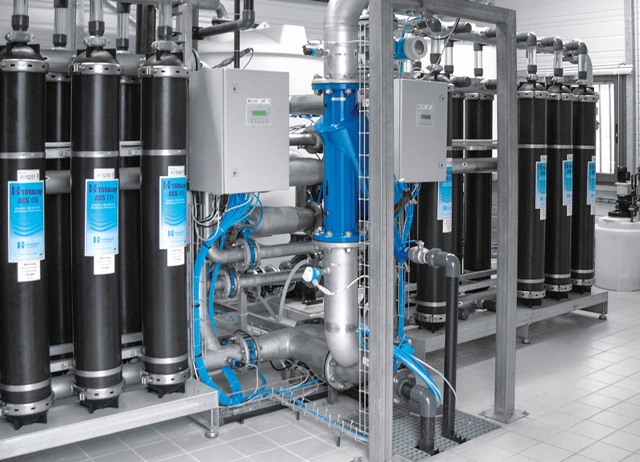Apr 13 2015
Smaller batches and different types of product in the same plant – these are the market demands to which more and more manufacturers in the process industries need to adjust. The answer is plants based on the "Lego" principle. Users can add modules or switch them off in line with requirements. But this can be achieved only with modular automation. The automation platform CPX from Festo is the central element in this concept – reflecting the motto "numbering up instead of scaling up“.
 Highly flexible skids are fully transportable filter systems for situations when the demand for water is low, requiring the treatment of up to 1,000 m³ of water per day. With transportable filter systems, water production can be started up very quickly. (Photo: Festo AG & Co. KG)
Highly flexible skids are fully transportable filter systems for situations when the demand for water is low, requiring the treatment of up to 1,000 m³ of water per day. With transportable filter systems, water production can be started up very quickly. (Photo: Festo AG & Co. KG)
Flexible and modular production plants require autonomous intelligent units. This is where the worlds of the process industry and manufacturing industry meet – in their approach to Industry 4.0, the fourth industrial revolution. Digitisation and networking enable automated modules at field level to be connected simply and reliably with a master control system, while also providing communication between them – in just the same way as Lego bricks click together to form a solid but nonetheless flexible structure.
Industry 4.0 as the solution
Flexible production processes, as described in the model “Industry 4.0”, are needed to maintain the competitiveness of process industries in ever more volatile markets. The prerequisite for this is adaptive, self-configuring and self-organising flexible production plants with a high level of networking. One of the steps necessary to achieve this – at least in the case of multi-product and batch plants – is the process-related and functional modularisation of plant sections.
Existing master control systems are not prepared for the automation of modular plants. Communication between operator and monitoring systems and controllers generally takes place via manufacturer-specific protocols.
Modular and intelligent
The plants of the future will consist of modules. Each module will incorporate all the automation functions which it requires to carry out its own process. Automation functions could also be provided by a central control system. However, a master control system is not designed for modular plants with their requirement for easy replacement of individual modules. Process-related modules, on the other hand, need a small, adaptable and autonomous automation system.
By implementing decentralised, intelligent solutions in the individual modules there is no need to re-program and re-configure the application software. The modules can be integrated with minimal effort into the overall automation solution for the production process. This allows several automated modules to be added to the plant without the need to extend the automation technology of the overall plant. "It is important to be able to expand or modify plants easily without having to go immediately to large-scale plants. In other words, numbering up instead of scaling up", explains Dr. Eckhard Roos, Head of Key Account and Industry Segment Management Process Automation at Festo.
Automation platform CPX
The Festo automation platform CPX has once again proved to be ideal as the central element of a modular automation system. This platform can accept not only pneumatic components in its IP65/67 variants but also different controllers and remote IOs for a number of sensors, for example for pressure monitoring or temperature measurement, on a modular basis.
In the field of water treatment, for example, skids in different configurations can be created, depending on the application. These fully transportable filter systems are especially interesting in cases where the demand for water is low, requiring the treatment of up to 1,000 m³ of water per day. With transportable filter systems, water production can be started up very quickly.
Variants of skids
While, for example, pump skids, with their low level of complexity, require only a few valve slices in the pneumatic section of a CPX/MPA, filter module skids need analogue inputs and outputs for pressure monitoring. More complex modules such as a CIP skid, which comprises plant sections and containers for cleaning agents and the mixing of cleaning solutions, require further automation modules on the CPX/MPA such as analogue inputs for temperature measurement or a controller for the proportional technology.
These skids must operate autonomously and be extremely reliable. They communicate continuously with a master controller which manages the overall system. Another advantage of the skids is that the costs for laying cables and wiring are comparatively low.
Advantages for engineering
These are not the only advantages of modular automation. For a complete process industry plant, using modules makes the engineering process faster and more cost -efficient, as there is no need to modify the entire automation concept by expanding the complete plant, but only to connect the relevant automation modules to the management system. This ensures seamless communication between the various levels of the automation pyramid.
For OEMs, the modular concept also means that it is possible to produce low volumes of uniform modules or even to produce skids for stock. As a result, they can enjoy economies of scale both in production and assembly, and reduce their costs. At the same time, the manufacturers' ability to deliver is enhanced, allowing their end users to reach their markets more quickly with the right production quantities of new products. "If we can also succeed in operating process industry plants via mobile terminals, this will be a further step forward towards Industry 4.0", says automation expert Roos.